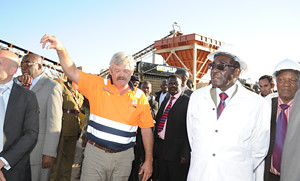
Republic of Zimbabwe President Robert Mugabe went on a fact-finding tour through two diamond mining projects in the Southern African nation. Zimbabwe is reported to be a large-scale depository of diamonds., a photo by Pan-African News Wire File Photos on Flickr.
Call for Zim diamond sanctions to be lifted
November 20, 2013
Johannesburg – An international meeting to discuss rules curbing the sale of conflict diamonds began yesterday with a call for the United States to lift sanctions on Zimbabwean mines.
Representatives of 81 countries taking part in the Kimberley Process heard a plea from the South African chairman that Washington follow the European Union’s lead and allow Zimbabwe’s return to fully fledged international trade.
South Africa’s Welile Nhlapo, who currently chairs the rotating presidency of the diamond watchdog, congratulated the European Union for “its decision to lift sanctions on Zimbabwe” after the July 31 harmonised elections won resoundingly by President Mugabe.
“We hope that those who continue to maintain such sanctions will also be able to lift them because the lifting of these sanctions would assist Zimbabwe to bring stability and prosperity once again,” he said at the start of the regulator’s four-day talks in Johannesburg.
The EU in September lifted sanctions against the Zimbabwe Mining Development Corporation, the firm that controls Marange, one of the world’s largest diamond fields.
Zimbabwe’s Mines and Mining Development Minister Walter Chidakwa threw his weight behind the recommendations of the UN-backed Kimberly Process.
“Since the EU has removed sanctions on our diamonds, we are calling on the United States to remove sanctions so that we can be able to do as much business as possible,” Minister Chidakwa told AFP.
The move by the EU allows the country to go back to trading at Antwerp, one of the world’s largest diamond centres, in Belgium.
“I hope that in December we will be able to make a full comeback into Antwerp,” Minister Chidakwa said on the sidelines of the annual assembly.
Diamond-producing countries, industry buyers and rights activists are meeting in South Africa to take stock of the work of the regulator amid calls for reforms in the body created 10 years ago to prevent so-called “blood diamonds” from filtering into the market.
Two other countries whose status will be up for review this week are Ivory Coast and Venezuela.
Ivory Coast is under a UN diamond embargo imposed in 2005, while Venezuela voluntarily pulled out of the KP in 2008 amid accusations of failure to respect the watchdog’s rules.
Calls for reforms are centred around the re-definition of the term “blood diamond”, which Mr Alan Martin, a researcher with Partnership Africa Canada, said has become “very outdated”.
The KP was created to prevent the proceeds of diamond sales from financing civil conflicts around the world and covers about 99,8 percent of the world’s production of rough gems.
World Diamond Council president Avi Paz backed the calls for reforms.
The council “supports the process of reform . . . including the expansion of its mission to include systematic acts of violence against communities that are directly associated with diamonds, although not necessarily within the context of civil war.”
But Mr Nhlapo feared that expanding the responsibility of the KP would threaten “its very credibility and existence.”
“The KP was not created to end conflict, or to end human rights abuses or to take retributive action against sovereign states,” he said.
No comments:
Post a Comment